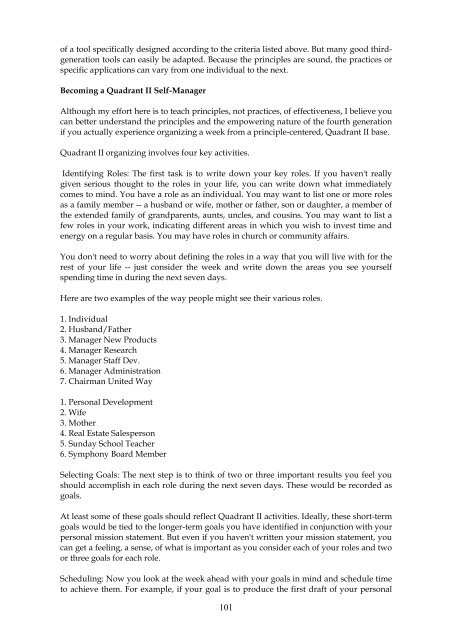Covey - The 7 habits of highly effective people
You also want an ePaper? Increase the reach of your titles
YUMPU automatically turns print PDFs into web optimized ePapers that Google loves.
<strong>of</strong> a tool specifically designed according to the criteria listed above. But many good thirdgeneration<br />
tools can easily be adapted. Because the principles are sound, the practices or<br />
specific applications can vary from one individual to the next.<br />
Becoming a Quadrant II Self-Manager<br />
Although my effort here is to teach principles, not practices, <strong>of</strong> <strong>effective</strong>ness, I believe you<br />
can better understand the principles and the empowering nature <strong>of</strong> the fourth generation<br />
if you actually experience organizing a week from a principle-centered, Quadrant II base.<br />
Quadrant II organizing involves four key activities.<br />
Identifying Roles: <strong>The</strong> first task is to write down your key roles. If you haven't really<br />
given serious thought to the roles in your life, you can write down what immediately<br />
comes to mind. You have a role as an individual. You may want to list one or more roles<br />
as a family member -- a husband or wife, mother or father, son or daughter, a member <strong>of</strong><br />
the extended family <strong>of</strong> grandparents, aunts, uncles, and cousins. You may want to list a<br />
few roles in your work, indicating different areas in which you wish to invest time and<br />
energy on a regular basis. You may have roles in church or community affairs.<br />
You don't need to worry about defining the roles in a way that you will live with for the<br />
rest <strong>of</strong> your life -- just consider the week and write down the areas you see yourself<br />
spending time in during the next seven days.<br />
Here are two examples <strong>of</strong> the way <strong>people</strong> might see their various roles.<br />
1. Individual<br />
2. Husband/Father<br />
3. Manager New Products<br />
4. Manager Research<br />
5. Manager Staff Dev.<br />
6. Manager Administration<br />
7. Chairman United Way<br />
1. Personal Development<br />
2. Wife<br />
3. Mother<br />
4. Real Estate Salesperson<br />
5. Sunday School Teacher<br />
6. Symphony Board Member<br />
Selecting Goals: <strong>The</strong> next step is to think <strong>of</strong> two or three important results you feel you<br />
should accomplish in each role during the next seven days. <strong>The</strong>se would be recorded as<br />
goals.<br />
At least some <strong>of</strong> these goals should reflect Quadrant II activities. Ideally, these short-term<br />
goals would be tied to the longer-term goals you have identified in conjunction with your<br />
personal mission statement. But even if you haven't written your mission statement, you<br />
can get a feeling, a sense, <strong>of</strong> what is important as you consider each <strong>of</strong> your roles and two<br />
or three goals for each role.<br />
Scheduling: Now you look at the week ahead with your goals in mind and schedule time<br />
to achieve them. For example, if your goal is to produce the first draft <strong>of</strong> your personal<br />
101


